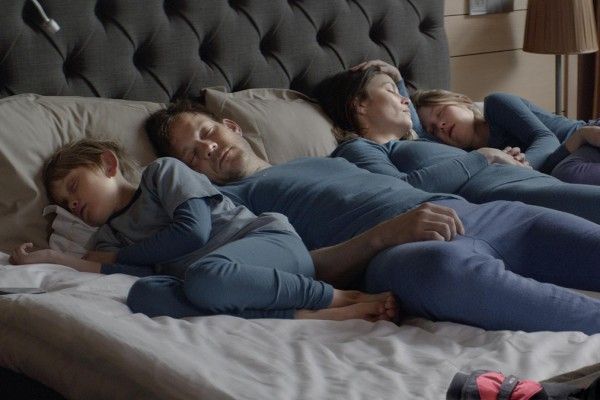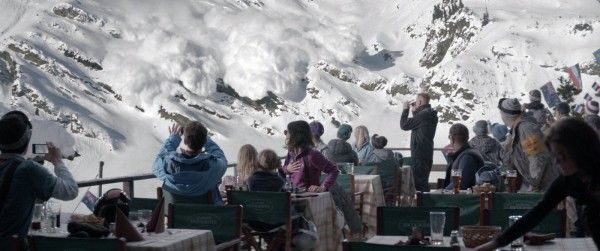What would you do if a seemingly harmful avalanche were headed towards you and your family? Would your instinct be to jump up and protect your loved ones, or would you simply ensure your own safety? That’s the question that kicks off the moral dilemma in writer/director Ruben Östlund’s Swedish film Force Majeure, and the choice sets off a ripple through the family dynamic at the center of the film, snowballing over the course of the story until it envelops the entire family unit and even those on the periphery. While this sounds like the premise of a dark, depressing character study, Östlund succeeds in exploring the issues of instinct and human nature as they relate to familial relationships with a heavy amount of humor, resulting in a moviegoing experience that is both highly entertaining and pointedly thought-provoking.
Force Majeure takes place during a five-day vacation in the French Alps, as Ebba (Lisa Loven Kongsli), her husband Tomas (Johannes Kuhnke), and their young children Harry (Vincent Wttergren) and Vera (Clara Wttergren) have opted to take advantage of this rare break from Tomas’ work to spend some time skiing at a fancy resort. The vacation starts out well enough, and they really do seem to be a happy and well-functioning family. During the second day of their trip, however, they find themselves eating lunch on a patio at the ski resort when a controlled avalanche starts heading their way. At first the sight entertains all of the onlookers, but as it approaches it appears to be heading straight for the patio. As the onslaught of snow is just about to crest, Ebba grabs both of her children and tries to pull them down, while Tomas instead reaches for his phone and gloves and runs away from the oncoming torrent, effectively abandoning his family in the process.
Now here is where Force Majeure could have taken a very different, and traditional path. Ebba and the children might have perished in the avalanche, leaving Tomas to agonize over his decision and fall into a deep despair. However, Östlund is more interested in exploring how this instinctual pull affects the family when the avalanche—though seemingly formidable—actually proves to be harmless; the patio is simply sprinkled with a light dusting. When everything settles and all are in good health, the family must now deal with the fact that Tomas chose his own well-being over that of his family.
We follow the couple after the mishap, and true to life, Ebba and Tomas at first seem happy to shake the event off and attempt to forget it ever happened. But when Tomas is unwilling to admit that he ran away from his family in the midst of a presumed disaster, retorting that his perception of the event was “different” than Ebba’s, the decision festers in Ebba’s mind and takes its toll on their relationship.
Tomas’ decision even starts to affect those only tangentially involved with the family. When friends Mats (a hilarious Kristofer Hivju) and Fanni (Fanni Metelius) arrive at the ski resort and hear the avalanche story recounted, Fanny considers what Mats would do in the same situation. A small rift arises between them as well, as the characters question what their significant other would really do in such a situation
We’d all like to think that we would make the “right” decision in dire straits, but when push comes to shove, not everyone would. Is it a remnant of our evolutionary self-preservation, or does it speak to how we really feel about those around us? Both Tomas and Ebba wrestle with this question onscreen, as Ebba feels Tomas’ action must mean that he somehow doesn’t care about his family, while Tomas can’t even face what he did and tries desperately to explain it away as being simply untrue.
Again, the struggle between Tomas and Ebba could have been portrayed as extremely heavy and dark—especially with regards to how the children react to what they clearly see as a major disagreement between their parents—but Force Majeure is straight up hilarious.
Östlund excels at finding humor in unexpected places. For example, when Tomas and Ebba finally confront the central issue head-on and have it out, Ebba decides to do so in front of Mats and Fanny. While listening to Ebba tell the avalanche story, the friends go from interested, to embarrassed, to concerned, with Mats humorously trying to explain away Tomas’ action. Relationships are hard, marriage is harder, and marriage with kids is a nearly herculean challenge, but life isn’t all darkness and sadness. There’s levity to be found even in the midst of the worst fights, and Östlund seizes the opportunity to highlight this fact. Some of the film’s most upsetting or emotional moments are punctuated with humor, and the movie is all the better for it.
The balance of humor and emotion is conveyed wonderfully by the excellent central performances. Lisa Loven Kongsli, in particular, brings a nuanced internal struggle to Ebba that grows as the film wears on. She’s faced with the prospect that her husband may not really care for his family, but does that discount the years of happiness they’ve had? Was it all a sham? Instead of going straight for the melodrama and having Ebba explode at her husband, take her kids, and slam the door on the way out, her intensity builds as she’s forced to ruminate on Tomas’ action and the subsequent fallout, all the while trapped in this claustrophobic environment of an upscale ski lodge.
The pacing of the film is a bit odd in places, with a couple of scenes feeling a tad out of place or abruptly ended. This leads to the movie feeling a little long towards its conclusion, but the premise itself maintains a solid sense of forward momentum thanks to the ever-present ticking clock of the five-day vacation. The tone is also tough to eloquently describe. It’s dramatic but it’s not really a drama, it’s comedic but it’s not really a comedy, and it’s meaty but not overly high-minded. It’s not one thing, and that’s what makes it so fulfilling.
While relationship stories have been done to death, Östlund finds a brilliant hook with which to dissect a marriage, taking the classic “what would you do” scenario and spinning it on its head. The film is wonderfully humorous but it still takes its characters seriously, and we genuinely feel for Ebba and Tomas—and especially their kids. Buoyed by swell performances, a deftly balanced tone, and refreshing levity, the film is an absolute delight delight from beginning to end.
Rating: B+
Click here for all of our TIFF 2014 coverage. Click on the links below for our other TIFF 2014 reviews:



